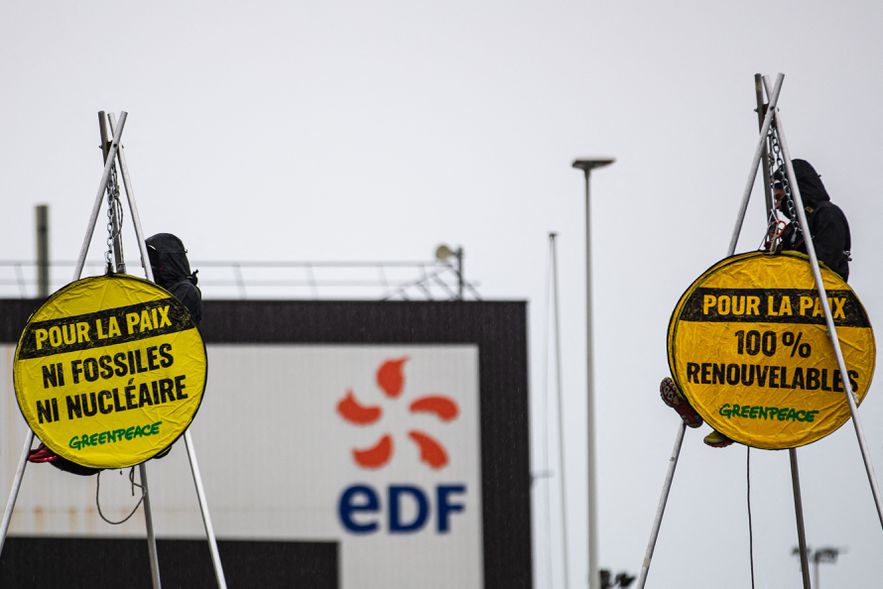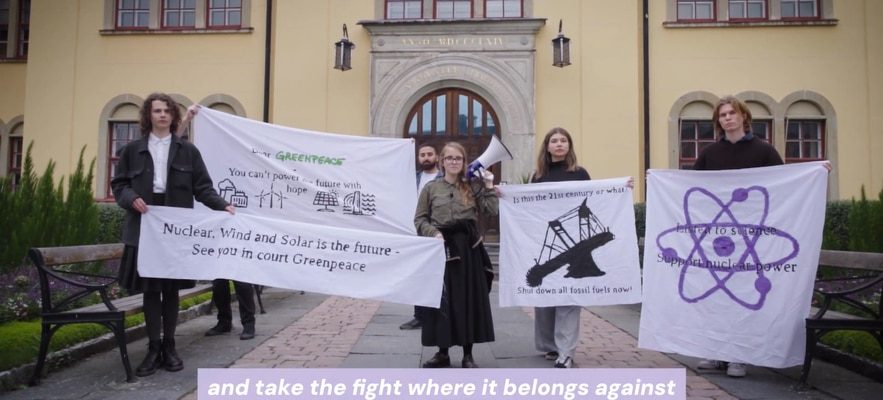“Dear Greenpeace, drop your old-fashioned, unscientific opposition to nuclear power, and join us in the fight against fossil fuels!” That wish comes from Ia Anstoot, the 18-year-old Swedish climate activist who launched the campaign “Dear Greenpeace”, this Monday, August 29. Megaphone in hand, youthful face, the one who took her first steps in the movement of Fridays for Future, these high school demonstrations against the climate emergency, unambiguously assumes its support for nuclear energy. A total opposite of the positions of Greenpeace, historically fiercely opposed to the civilian atom, and of many organizations for the defense of the climate.
So, should we see in Ia Anstoot the antagonist of his compatriot Greta Thunberg, two years his senior? Difficult to go that far. She herself says that she “began to act for the environment at 13 by following in the footsteps of Greta Thunberg, and by striking in front of the town hall of my city. Like so many other young strikers, I was desperate to lack of change and I was afraid for my future.” But the Swedish activist says that “going from the anxiety and despair of movements like the Fridays for Future to the hope and realism of the pro-nuclear environmental movement was a life-changing experience.”
The 18-year-old Swedish environmental activist Ia Anstoot, at the origin of the “Dear Greenpeace” campaign, calls on the NGO to reconsider its anti-nuclear commitment. /Replanet video capture
© / Replanet video capture
Ia Anstoot says it herself: Greenpeace is an organization that she “respects” and which has “inspired” her. But you have to “sometimes oppose the people you love.” This opposition, she wants to take it to the Court of Justice of the European Union, that is to say where Greenpeace has seized the European Commission against its controversial decision to qualify nuclear and gas as energies ” green”, benefiting from a simplified taxonomy to attract investment. The environmental NGO denounces a nuclear greenwashing campaign; “Dear Greenpeace” wishes to plead the opposite.
“Being green and for nuclear power must become the norm”
Faced with this unusual campaign, Greenpeace recognizes that the profile of these new opponents is “a bit new”. The NGO insists on not wanting to “question the sincerity of these young people in their fight for the climate”. Even if, specifies Nicolas Nace, energy transition campaign manager at Greenpeace France, “they are carrying out this operation with an openly pro-nuclear organization”. The latter notably points the finger at the RePlanet association, which hosts the “Dear Greenpeace” campaign, assumed support of the atom and defining itself as “ecohumanists”.
The French branch of RePlanet is headed by Myrto Tripathi, herself the parallel president of the association Les Voix du Nucléaire. A position fully assumed by François Jaffré, French representative of the “Dear Greenpeace” campaign, and himself responsible for public affairs for Voix du Nucléaire and member of RePlanet France. “Yes, all the young people involved in RePlanet have a real climate awareness, explains the 24-year-old activist. Ia Anstoot’s journey is also quite eloquent. It’s not just a defense of the nuclear lobby, which has in any case its own institutions to defend itself. But if we take up the same arguments, it is because we think that they are the right ones.
François Jaffré explains that beyond asking Greenpeace to change its mind on nuclear – “not a simple pious wish, the Greenpeace branch in Finland having for example announced that they were stopping their anti-nuclear campaign”, specifies- he -, the objective is also to show that “not all environmentalists are anti-nuclear, and that being green and for nuclear power must become the norm.”

Greenpeace activists block the entrance to the EPR third-generation nuclear reactor in Flamanville, Normandy, to protest against the “irresponsibility” of pro-nuclear presidential candidates, on March 31, 2022, ahead of the French presidential election in April 10. Seven other activists were arrested for trespassing on the site.
© / AFP
According to them, the action of Greenpeace would be counter-productive in the fight against fossil fuels and for the climate. “More than a third of clean energy in the EU comes from nuclear energy, so Greenpeace’s proposal to get rid of it is really harmful”, judges Ia Anstoot in the British newspaper The Guardian, adding that the environmental group would be “stuck in the past fighting low-carbon nuclear power while the world is burning, literally.” An accusation that Nicolas Nace, of Greenpeace, rejects. “What bothered us the most in the gallery was the accusation of playing into the game of fossil fuels, when we are one of the NGOs that acts the most against this industry. We must be measured in the about, and not to shoot each other in the paws between militants who share common objectives.”
The indisputable influence of Jean-Marc Jancovici
It is difficult to predict the real importance of this campaign, which looks like a publicity stunt. But it testifies to the clear resurgence of nuclear popularity among young people in France. And on this ground, impossible not to mention the influence of the magnetic Jean-Marc Jancovici. Trained engineer and comic book author An endless world (Dargaud), the best-selling book in France in 2022, the one that combines fierce defense of nuclear power and necessary degrowth has become the icon of a whole youth in search of hope in the face of climate change. The latter has particularly gained wide popularity among young engineers, looking for solutions and a concrete commitment to reconcile their profession and their environmental convictions.
On the side of Greenpeace, we readily recognize that the arguments which have long been legion against nuclear energy are no longer sufficient to convince today. “Issues around nuclear safety or waste seem to worry people less. It’s understandable, the climate emergency is the first source of anxiety”, admits Nicolas Nace. Even in resolutely anti-nuclear political parties, such as Europe Ecologie-Les Verts and La France insoumise, opposition to the atom is beginning to be debated, especially by younger activists. Marine Tondelier, national secretary of EELV, explained that she had been “hit” by the emergence of “very green people, and very pro-nuclear” in the population. Questioned by AFP last March, Noé Duprat-Lassus, member of the executive committee of the Young Ecologists until 2022, testified to a “real generational divide” on the party line concerning the civil atom.
Some, including Greenpeace, therefore had to water down their wine, and introduced a slight shift in their position on the atom: “A few years ago, we were for an immediate closure of the nuclear fleet in France Today, we are calling for it to be closed gradually with, in parallel, the development of renewable energies and the renovation of housing”, concedes Nicolas Nace.
“We’re not nuclear freaks!”
Facing them, Les Voix du Nucléaire also wishes not to fall into the caricature of support for the atom. “We are for the increase in the wind or photovoltaic park. We’re not nuclear freaks!” argues François Jaffré. “There are many political figures who are directly opposed to renewable energies with arguments at the level of the daisies. We don’t collaborate with them. We just say that we need an increase in all the means of production, and nuclear power is one of them. An energy mix with only intermittent renewable energies is not possible in France today.” A commitment that is all the more highlighted as the energy crisis, amplified by the war in Ukraine and the exit from European dependence to Russian gas highlighted the urgency of questioning the energy future of France and the continent.
However, Nicolas Nace assures him: “It is above all the oldest people who remain the most favorable to nuclear power”. A conclusion shared by a Ifop survey published in September 2022, which estimated that 64% of 18-25 year olds supported the production of nuclear energy in France, the least favorable age group of all. Because on the other side, it is nearly 76% of 50-64 year olds and especially 84% of 65 year olds and over who declared themselves in favor of the atom. But this does not come to hinder the observation of the progression of support for nuclear energy in public opinion: according to another poll, this time published by the Odoxa Institute60% of French people would have a positive image of nuclear power in 2022, compared to 34% in 2019. With, among this increase of 26 points in three years, a share of young environmentalists, committed to the climate.
